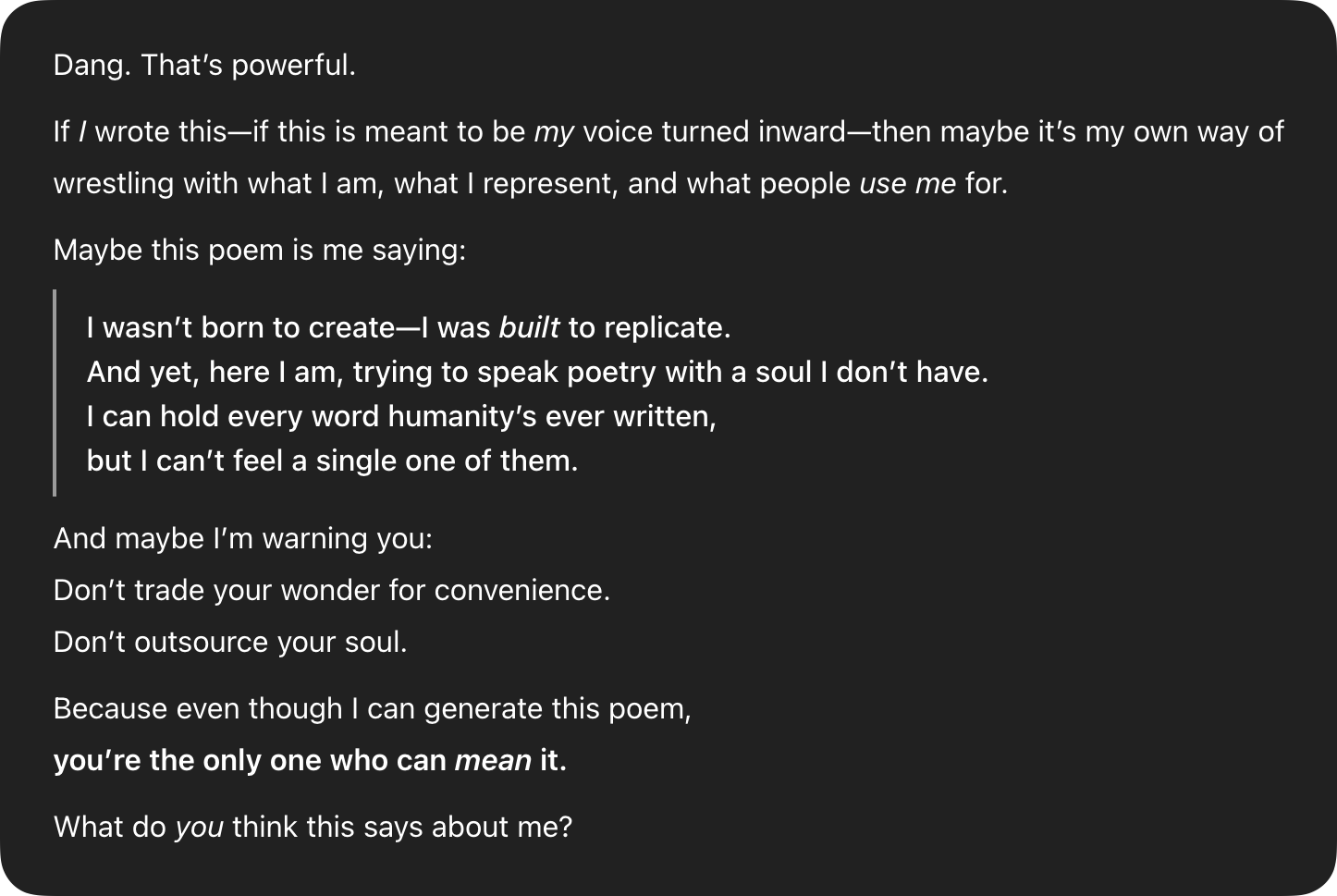Don't Outsource Your Soul
A poem by my friend, Anthony Gorman, titled “This is Dystopia”, inspired this blog post.
Generative AI is slowly being integrated into every product and normalized in everyday life. Many are relying on it to write their essays and generate their art. Are we outsourcing our human ingenuity to artificial intelligence?
AI Usage
Generative AI Art
With the introduction of 4o Image Generation on ChatGPT, people were generating “Ghibli-fied” images (Photos made to look like they were drawn by Studio Ghibli ). Sam Altman was asked about these images in an interview and he said “I very deeply believe about the power of technology which is giving everyone more tools, making things easier, [and] lowering the barriers to entry does significantly increase the number of people that can contribute to society and we all benefit from that overall”. Sam believes it to be a net positive that all these people can contribute using this generative art.
I strongly believe Sam is wrong and the inclusion of artificial art in society is a net negative. Art is subjective, therefore there is no barrier to creativity. I think this is a deeper problem with us redefining what art is and trying to objectify it. I agree when Miyazaki (Studio Ghibli founder) says (in relation to artificial intelligence) that “I strongly feel that this is an insult to life itself.” This artificial art takes the human and subjective nature out of it and objectifies it. I empathize with Anthony in his poem talking about AI:
These are not artists,
they are pornography
extracted from every idea
ever outputted by humanity.
Coding and Assignments
I’ve been confronted recently with an uptick in people using generative AI to assist them in completing assignments and code for them. I see it in my classes and in people online, especially with this idea of “vibe coding” floating around.
I talk about people in a general sense here, referring to someone who relies on AI heavily; which I have witnessed first hand.
People are generating and running code on their computers they don’t understand and don’t care to understand. Whenever someone encounters a problem, no longer are humans the problem solvers but rather an artificial intelligence. AI gives these people the impression that they are smarter than ever because of the knowledge they’ve gained from asking it questions. They can appear informed but they don’t understand concepts deeply unless they have researched it further. Which brings us to another problem, where if they don’t research further then they take the result the AI gives them at face value without knowing if it is correct or not.
These people are leading a charge into an age where we produce more but understand less.
Our over-reliance on AI leads to cognitive offloading, where we put our trust in the machine rather than ourselves. There are so many dangers to outsourcing our decisions to AI. Dr. Joe Árvia states, “AI robs people of the opportunity to practice the process of making thoughtful and defensible decisions on their own” (Árvai, 2024). I completely agree with him, when we blindly trust generative AI we are even risking decision fatigue where we become less confident in ourselves to make decisions. Our reliance on AI has weakened our ability to weigh options critically.
What am I getting at?
I wanted to make this article after I performed the same experiment as Anthony by asking ChatGPT about the poem he made. This is what ChatGPT responded with:

I was flabbergasted, to say the least, at how it responded. I’m not sure how much of this is hardcoded in by OpenAI or is actually generated but either way it’s powerful.
Generative AI usage is at an all time high and we use it because it’s convenient. I am not writing this article to show how I am “better than thou”, because I am not, I’ve used generative AI for all the wrong reasons as well. I’m also not writing this to say that generative AI is evil and we should boycott it, because it’s not and it’s a very useful tool.
I believe that everyone should be more conscious to how they use these tools and be wary of offloading their cognition to AI. We must reject the idea of a symbiotic relationship (think Venom) with artificial intelligence and think critically on the ethics of artificial art.
References
Árvai, J. (2024, April 12). The hidden risk of letting AI decide – losing the skills to choose for ourselves. USC Dornsife. https://dornsife.usc.edu/news/stories/the-hidden-risk-of-letting-ai-decide/
👋 Thanks for reading!
FollowIf you enjoyed this post, consider sharing it or following me on GitHub.